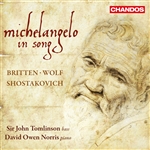BENJAMIN BRITTEN
(1913-1976)
Seven Sonnets of Michelangelo, Op. 22 (1940)
16:26
for Tenor and Piano
Transcribed for Bass and Piano by David Owen Norris
To Peter
1.
1
Sonneto XVI. 'Si come nella penna e nell'ichiostro'.
1:52
Tempo giusto
2.
2
Sonetto XXXI. 'A che più debb'io mai l'intensa voglia'.
1:28
Con moto appassionato
3.
3
Sonetto XXX. 'Veggio co' bei vostri occhi un dolce lume'.
3:36
Andante tranquillo
4.
4
Sonetto LV. 'Tu sa' ch'io so, signor mie, che tu sai'.
1:33
Poco presto ed agitato - Più lento e tranquillo - Tempo I
5.
5
Sonetto XXXVIII. 'Rendete agli occhi miei, o fonte o fiume'.
2:00
Allegretto quasi una serenata
6.
6
Sonetto XXXIL. 'S'un casto amor, s'una pietà superna;.
1:45
Vivace
7.
7
Sonetto XXIV. 'Spirto ben nato, in cui si specchia e vede'.
4:11
Largo
HUGO WOLF
(1860-1903)
Drei Gedichte von Michelangelo (1897)
9:44
for Bass and Piano
in German translations by Walter Heinrich Robert-Tornow (1852-1895)
8.
1
'Wohl denk' ich oft'.
1:44
Ziemoich getragen, schwermütig - Etwas belebter - Gemessin
9.
2
'Alles endet, was entstehet'.
3:52
Langsam und getragen - Etwas bewegter - Erstes Zeitmaß
10.
3
'Fuhlt meine Seele'.
3:52
Sehr langsam und ruhig - Etwas bewegter - Immer etwas drängender -
DMITRI SHOSTAKOVICH
(1906-1975)
Suite, Op. 145 (1974)
36:41
on Verses of Michelangelo Buonarroti (1475-1564)
for Bass and Piano
in Russian translations by Abrams Efros (1888-1954)
To Irina Antonovna Shostakovich
12.
2
Morning. Allegretto - Maestoso
2:42
13.
3
Love. Allegretto
3:46
14.
4
Separation. Moderato
2:06
15.
5
Anger. Allegro non troppo
1:42
16.
6
Dante. Moderato -
3:16
17.
7
To the Exile. Largo - Maestoso
4:15
18.
8
Creativity. Moderato
2:22
19.
9
Night (a dialogue). Andante
3:54
20.
10
Death. Adagio
5:06
21.
11
Immortality. Allegretto
3:40
















 My Wish List
My Wish List




